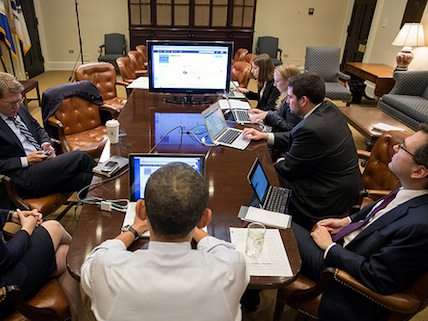Here's Why the Obama Administration Wanted the NSA Data-Mining Program Kept Secret
It's the only way to prevent any sort of meaningful check or balance on executive power.

I was reading up on the National Security Agency's data-mining program when I came across this tweet by Matt Apuzzo of the Associated Press:
If the programs needed secrecy to succeed, will NSA shut them down now? If not, did they ever need be secret? Or did I just blow your mind?
— Matt Apuzzo (@mattapuzzo) June 7, 2013
Why does this program have to be kept secret? It's not like American consumers will just stop using cell phones, or wireless networks, or social networks. (A person could do that, but who's actually willing to? Much as I loathe government surveillance, I'm not giving up Facebook or Gmail or my account with Verizon. I doubt many people are.) It's also not like Americans didn't know something like this was going on. So why keep it secret that the government is mining data when Americans will continue to provide data regardless?
The Washington Post's Greg Sargent raised the same point this morning. The administration's many defenses of these invasive tactics, he argued, do not "explain the need for the program — and its legal rationale — to remain shrouded in secrecy."
But there actually is an explanation, and it's laid out really well by Jennifer Hoelzer, former communications director for Patriot Act critic Sen. Ron Wyden (D-Ore.). Here's Hoelzer in the Huffington Post explaining how the Foreign Intelligence Surveillance Court (FISC) decides when to grant data-mining authority to the NSA:
[E]ven if one of these [FISC] judges issued a controversial ruling the decision can be appealed right?
Technically, yes. But who's going to appeal it?
Let me give you an example. Let's say a police officer wants to strip search you. You've done nothing wrong, but the police officer disagrees and says he needs to strip you to prove it. Under the criminal justice system, you get to bring that argument to a judge, who will issue a ruling only after listening to the government's reasons for wanting to strip search you and your reasons for why they shouldn't be allowed to do that. In the event that the judge rules against you and finds that the police officer has probable cause to search you, not only do you have a right to appeal that judge's decision all the way to the Supreme Court, you are welcome to talk to as many reporters, friends, relatives and elected officials as you want to along the way. And, if the public doesn't agree with the police force's policy on strip-searching, they can pressure lawmakers to change the law or -- if in California -- push for a ballot measure.
However, let's say the government wants Verizon to hand over all of your phone records (not just who you call, but who calls you, how long your conversations were and where you were when you had the conversation). You're never going to know about it, much less get a chance to argue against it. The FISC judge who signs off on the government's data collection will only hear the government's argument for why it should be lawfully allowed to collect data on you. If the judge rules against the government, the government can appeal the decision, but if/when the judge agrees with the government there is no other side to appeal the decision. Moreover, the judge's ruling is classified, so even if the ruling is outlandish, it can't be reported or even debated on the Senate floor.
So, the Administration could be relying on some crazy/twisted interpretations of the Patriot Act and we'd never know about it?
That is what Senator Wyden has been warning, starting as far back as July 2008 when he first argued for the declassification of FISA court opinions. I think he put it best when he said "reading the text of the Patriot Act without the secret court opinions is like being able to read McCain-Feingold without being allowed to know about Citizens United." Congress passed the Patriot Act, but Congress can't debate whether or not the Administration is interpreting the Patriot Act the way it intended the Patriot Act to be interpreted. Moreover, the American People aren't being given an opportunity to weigh in.
But the Justice Department says this authority is essential to national security. Wouldn't telling the American people undermine that?
By that logic it could be argued that all surveillance laws should be kept secret in order to make it harder for adversaries to guess how we collect intelligence, but that's not how a democracy works. American citizens are supposed to have a say in the laws that govern them and no matter how noble the Justice Department's intentions are, its officials don't have the right to substitute their judgment for the judgment of the American people. In the event that they have doubts that the American people will support a program they believe is necessary to national security, they are obligated to bring that program up for debate, not classify it and hope no one finds out.
In other words, they want to keep it secret because that's the only way to prevent any sort of meaningful check or balance on executive power.


Show Comments (108)